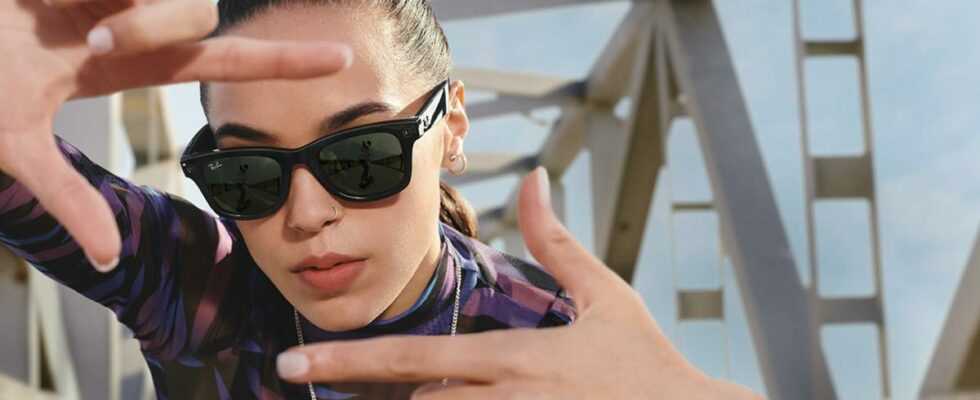Available in three models, these glasses for taking photos and videos will be sold from 329 euros.
The first connected glasses from Facebook arrive in France. Designed with the EssilorLuxottica group, the Ray-Ban Stories will be marketed from April 14 at a minimum price of 329 euros. Those in a hurry can go to Belgium, Spain or Austria, where these glasses will be sold from March 17.
EssilorLuxottica, the parent company of Ray-Ban, signed a multi-year partnership with the Meta group in September 2020 to develop connected glasses. The Stories are the first fruit of this collaboration. “Until now, connected glasses were products designed by tech companies. Here we reverse the concept“, explains Fabio Borsoi, R&D director at Luxottica.
Read alsoFacebook and Ray-Ban unveil their pair of connected glasses, the Ray-Ban Stories
Up to 60 seconds of video
The Ray-Ban Stories are indeed above all Ray-Ban (Wayfarer, Meteor and Round models, available in five colors and with solar, polarized, progressive, gradient, corrective lenses, etc.), to which two cameras have been added, a microphone and two speakers. The user can take photos or up to 60 seconds of video by pressing a button or by voice command. He can then rework them via a mobile application, Facebook View, then publish them on social networks. “Automatically broadcasting what we film is impossible“says Meta.
SEE ALSO – Facebook changes its name, and becomes “Meta”
The glasses also allow you to take phone calls or listen to music, thanks to the speakers facing the ears of the user. According to Luxoticca, this is also the main use of Ray-Bans Stories among its first buyers in the United States or Italy, where the product has been available since September 2021. “Commitment stays high over time“, notes Fabio Borsoi. The average autonomy of the glasses is 4 hours, and they recharge in a connected case.
Protection of private life
The Ray-Ban Stories are for Meta a small step towards its metaverse project, presented in October by Mark Zuckerberg. The latter dreams of creating devices with the same appearance as eyeglasses, but capable of projecting virtual elements in front of our eyes, such as the avatars of participants in a remote meeting. The user could navigate in this virtual universe with his hands and thanks to his voice. But this technological challenge should not be completed for another ten years.
Read alsoMetavers: how Facebook wants to immerse its users “into the internet”
In the meantime, the Ray-Ban Stories are not without questions about the protection of privacy. The glasses emit a small light next to one of the temples when the camera is active. But the Irish Data Protection Commission (DPC) and its Italian alter ego Garante have warned that this is not enough to warn people around the user that they are being filmed. “Full field testing has not been demonstrated by Facebook or Ray-Ban to ensure the indicator light is an effective means of notification“, they had indicated in September.
Meta claims to have worked on these issues with associations and is betting on a code of good conduct. “The Facebook View application will remind you to turn off the glasses when you are in sensitive places”, do not film people without their consent, or do not try to hide the indicator light, indicates the group. Will this be enough? In any case, it is difficult not to think of Google Glass (2014), some users of which had been attacked by critics of these devices, in France and in the United States.
SEE ALSO – Facebook: Meta VP responds to hate speech criticism
